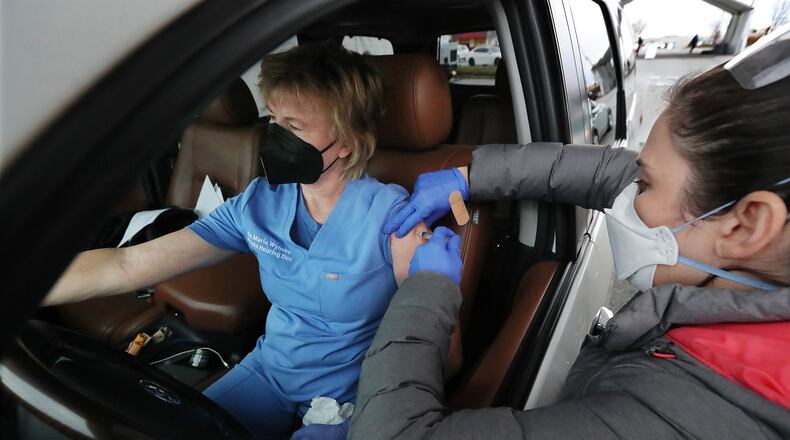This story was updated after a noon press briefing.
The Trump administration announced new recommendations on Tuesday to states to expand their coronavirus vaccination programs to all persons 65 and older and adults with co-morbidities, a step towards accelerating immunizations.
U.S. Health and Human Services Secretary Alex Azar said the supply chains for the Pfizer and Modera vaccines are enough to expand eligibility for more vulnerable persons. He said the nation’s reserve doses will be released to the states to expand first shots to as many eligible people as possible, with new manufacturing believed to be adequate to provide supplies for required second doses.
Azar said states need to ramp up their efforts to get shots in arms or to improve their reporting. Improved reported output of vaccinations will play a role in how much vaccine will be allotted to states going forward.
Azar said the U.S. has more than enough vaccine to supply doses to all persons in Phase 1-A, which includes front line health workers and residents of long-term care facilities, and that made Tuesday’s announced expansion possible.
“Use every channel, get the vaccine out there,” Azar said in a media briefing. “I would rather have people working to get appointments to get vaccinated rather than having vaccines wasted in freezers.”
The nation has lagged the pace Trump officials set in the fall in getting doses of vaccines into people’s arms, and Georgia’s reported pace of administration is among the worst in the U.S.
But Georgia officials have said that’s in part due to lags in reporting.
Providers under Operation Warp Speed are required to report doses administered with in 72 hours, a drastic change for reporting of most other vaccines, in which providers have 30 days.
That has created technical changes for many states. It’s also labor intensive for health systems burdened by rising cases of COVID-19.
Georgia recently launched an information page on the DPH website for residents to find providers. Local health districts have reported jammed phone lines, and residents have expressed deep frustration in the limited number of available appointments.
Azar blamed poor data reporting and “micromanaged” administration of vaccinations for the slow reported pace of rollout in some states. He said some states have worked to complete Phase 1-A shots before opening to other vulnerable populations.
Georgia recently expanded its vaccination criteria to include seniors, pending available supply of doses.
It’s unclear how quickly states will be able to expand their vaccination efforts, as many, including Georgia are already overwhelmed by demand.
Operation Warp Speed is giving states two weeks to improve their performance and their reporting before changing allocation criteria. After two weeks, states will be judged on how much vaccine they have received and how much they have administered in determining how much vaccine states will get moving forward.
Up until now, vaccine was allocated on a per capita basis. The idea is to be an incentive to speed up administration and reporting.
The Pfizer and Moderna vaccines require two shots for full protection, with a second shot scheduled for 21 days or 28 days, respectively, after the first.
Azar said that schedule will continue to be maintained. He said the companies are producing enough vaccine to provide patients with second doses while expanding eligibility.
An email message left with Gov. Brian Kemp’s office and Georgia Department of Public Health was not immediately returned. Kemp has a press conference scheduled for later today.
The new federal vaccination guidelines come days after President-elect Joe Biden announced his administration would make a similar expansion to vaccination efforts, including distributing vaccine more broadly to get the first shot into more people.
Some medical experts have expressed objections about proceeding with a one-shot plan, as the emergency use authorization granted the vaccines was based off a two-shot protocol.
“We must ensure that once you get a first vaccine, you get a second within the 21- or 28-day window,” Azar said.
Azar said the incoming Biden administration will be briefed, but the announcement Tuesday was the decision of the current administration.
Georgia has about 1.5 million residents 65 and older, according to U.S. Census data. State governors will decide what documentation is required in considering which people with co-morbidities will be eligible upon expansion.
But as of Monday, DPH reported about 207,000 doses of vaccines had been administered and about 700,000 doses shipped statewide. But those doses also are available for first responders and health workers, eligible under the state’s Phase 1-A vaccination plan.
About the Author
Keep Reading
The Latest
Featured


